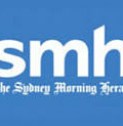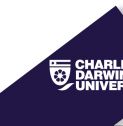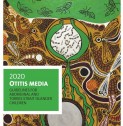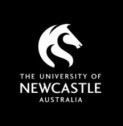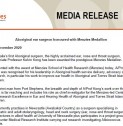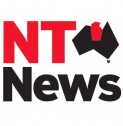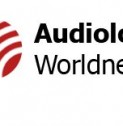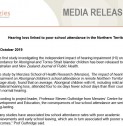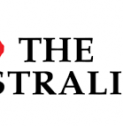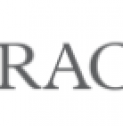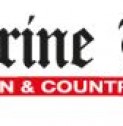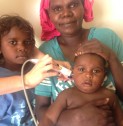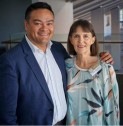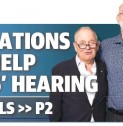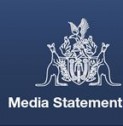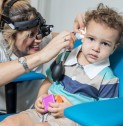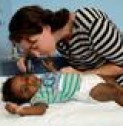
Indigenous children have the highest reported rates of otitis media (OM), commonly known as middle ear infection, and burst eardrums in the world.
Nine out of 10 young Indigenous children who live in remote communities have some form of ear disease, and one in six has burst eardrum(s).
Long-term middle ear damage causes hearing loss, which impacts on the development of speech and language, and is linked to educational disadvantage and behavioural problems.
Our research focus:
- We conduct prevention and treatment trials that assess which therapies work best for Indigenous children. These evidence-based trials influence policy and practice.
Our research impact:
- Improving the diagnostic skills and management of OM in remote clinics will be aided by this updated guideline, prepared by the Menzies Ear Health Team, the Otitis Media Guidelines.
- Children who carry high numbers of bacteria in their noses are more likely to suffer from severe ear disease. Treatments that reduce the density of bacteria may reduce the severity of infection, particularly eardrum perforation. Strategies that delay or prevent bacterial acquisition in the first months of life are needed – these may be through vaccination or improved living conditions.
- The efficacy of azithromycin in resolving bulging eardrums is being evaluated in a randomised controlled trial (RCT).
- In a RCT of daily swimming lessons, children with 'runny ears' were neither improved nor worsened compared to children who engaged in other non-swimming play activities.
- Contacting families via SMS messages is an acceptable communication strategy to try to improve the health of their children's ears, but more needs to be done to improve access and quality of health services for ear disease.
- The impact of each new pneumococcal vaccine is being evaluated by regular surveillance of ear health and bacterial pathogens in young children across remote regions of the Northern Territory and in Western Australia.
- Two RCTs are evaluating the effect of combining pneumococcal vaccines at an earlier age on onset and persistence of OM and bacterial infection. In addition to antibody concentrations, the functioning of the immune response is also being evaluated.
Key staff:
- Professor Amanda Leach AM
- Professor Peter Morris
- Christine Wigger
- Nicole Wilson
- Jemima Beissbarth.
- VOICES - Vaccines to prevent Otitis media In Children Entering School
- Developing more accurate measures of immune response and vaccine efficacy of standard and novel schedules of two new pneumococcal conjugate vaccines (Prevenar13 or Synflorix) in Indigenous infants
- Immunogenicity, carriage and otitis media outcomes of pneumococcal conjugate vaccines PHiD-CV and 13PCV in sequence or alone in high-risk Indigenous infants: a randomised controlled trial (PREV-IX_COMBO)
- IHEARBETA - Indigenous Healthy EARs- BEtadine, Tissues and Antibiotics study: a 2x2 factorial randomised controlled trial
- Monitoring Prevenar13 impact on otitis media and respiratory pathogen carriage, with particular focus on pneumococcal diversity, in Australian Indigenous children post-PCV13 introduction to the NIP
- Pneumococcal conjugate vaccine (PCV) schedules for the Northern Territory (NT): randomised controlled trial of booster vaccines to broaden and strengthen protection from invasive and mucosal infections (Study name: PREV-IX_BOOST)
- Randomised controlled trial of watchful waiting versus antimicrobial treatment waiting for acute otitis media without perforation in low risk Aboriginal children
- Centre of Research Excellence in Ear and Hearing Health of Aboriginal and Torres Strait Islander Children (CRE-ICHEAR)
- Hearing for Learning Initiative
- Deadly Ears in Deadly Hands
- Oguoma, V.M., Wilson, N., Mulholland, K., Santosham, M., Torzillo, P., McIntyre, P., . . . Leach, A.J. (2020). 10-Valent pneumococcal non-typeable H. influenzae protein D conjugate vaccine (PHiD-CV10) versus 13-valent pneumococcal conjugate vaccine (PCV13) as a booster dose to broaden and strengthen protection from otitis media (PREVIX_BOOST) in Australian Aboriginal children: study protocol for a randomised controlled trial. BMJ Open, 10(5), e033511.
- He, V.Y., Guthridge, S., Su, J.Y., Howard, D., Stothers, K. & Leach, A.J. (2020). The link between hearing impairment and child maltreatment among Aboriginal children in the Northern Territory of Australia: is there an opportunity for a public health approach in child protection? BMC Public Health, 20(1), 449. doi:10.1186/s12889-020-8456-8.
- Kaspar, A. & Leach, A.J. (2020). Hearing loss among Australian Aboriginal infants and toddlers: A systematic review. Public Health in Practice, 1. doi:10.1016/j.puhip.2020.100048.
- Beissbarth, J., Smith-Vaughan, H.C., Harris, T.M., Binks, M.J. & Leach, A.J. (2019). Use of the 10-valent pneumococcal Haemophilus influenzae protein D conjugate vaccine (PHiD-CV10) in an Australian Indigenous paediatric population does not alter the prevalence of nontypeable Haemophilus influenzae without the protein D gene. Vaccine, 37(30), 4089-4093. doi: 10.1016/j.vaccine.2019.05.079
- Brophy-Williams, S., Jarosz, K., Sommer, J., Leach, A.J. & Morris, P.S. (2019). Preventative and medical treatment of ear disease in remote or resource-constrained environments. J Laryngol Otol, 131(S2), 1-14. doi:10.1017/s0022215119000057.
- He, V.Y., Su, J.Y., Guthridge, S., Malvaso, C., Howard, D., Williams, T. & Leach, A.J. (2019). Hearing and justice: The link between hearing impairment in early childhood and youth offending in Aboriginal children living in remote communities of the Northern Territory, Australia. Health Justice, 7(1), 16. doi:10.1186/s12889-020-8456-8.
- Su, J.Y., He, V.Y., Guthridge, S., Howard, D., Leach, A.J. & Silburn, S. (2019). The impact of hearing impairment on Aboriginal children's school attendance in remote Northern Territory: a data linkage study. Aust N Z J Public Health, 43(6), 544-550. doi: 10.1111/1753-6405.12948.
- Wigger, C., Leach, A.J., Beissbarth, J., Oguoma, V., Lennox, R., Nelson, S., . . . Morris, P. (2019). Povidone-iodine ear wash and oral cotrimoxazole for chronic suppurative otitis media in Australian aboriginal children: study protocol for factorial design randomised controlled trial. BMC Pharmacol Toxicol, 20(1), 46. doi:10.1371/journal.pone.0215483.
- Jervis-Bardy, J., Carney, A.S., Duguid, R. & Leach, A.J. (2017). Microbiology of otitis media in Indigenous Australian children: review. J Laryngol Otol, 131(S2), S2-S11. doi:10.1017/s0022215116009294.
- Jervis-Bardy, J., Leong, L.E., Marri, S., Smith, R.J., Choo, J.M., Smith-Vaughan, H.C., . . . Marsh, R.L. (2015). Deriving accurate microbiota profiles from human samples with low bacterial content through post-sequencing processing of Illumina MiSeq data. Microbiome, 3, 19. doi:10.1186/s40168-015-0083-8.
- Leach, A.J. Wigger, C., Beissbarth, J., Woltring, D., Andrews, R., Chatfield, M.D., Smith-Vaughan, H. & Morris, P.S. (2016). General health, otitis media, nasopharyngeal carriage and middle ear microbiology in Northern Territory Aboriginal children vaccinated during consecutive periods of 10-valent or 13-valent pneumococcal conjugate vaccines. Int J Pediatr Otorhinolaryngol, 86, 224-232. doi:10.1016/j.ijporl.2016.05.011
- Nicholls, T.R., Leach, A.J & Morris, P.S. (2016). The short-term impact of each primary dose of pneumococcal conjugate vaccine on nasopharyngeal carriage: Systematic review and meta-analyses of randomised controlled trials. Vaccine, 34(6), 703-713. doi:10.1016/j.vaccine.2015.12.048.
- Smith-Vaughan, H.C., Beissbarth, J., Bowman, J., Hare, K.M., Price, E.P., Pickering, J., Lehmann, D., Chang, A.B., Morris, P.S., Marsh, R.L. & Leach, A.J. (2016). Geographic consistency in dominant, non-typeable Haemophilus influenzae genotypes colonising four distinct Australian paediatric groups: a cohort study. Pneumonia (Nathan), 8, 13. doi: 10.1186/s41479-016-0013-y.
- Jervis-Bardy, J.R., Rogers, G.B., Morris, P. S., Smith-Vaughan, H. C., Nosworthy, E., Leong, L.E., Smith, R.J., Weyrich, L.S., De Haan, J., Carney, A.S., Leach, A.J., O'Leary, S. & Marsh, R.L. (2015). The microbiome of otitis media with effusion in Indigenous Australian children. Int J Pediatr Otorhinolaryngol, 79(9), 1548-1555. doi:10.1016/j.ijporl.2015.07.013.
- Leach, A. ., Wigger, C., Hare, K., Hampton, V., Beissbarth, J., Andrews, R., Chatfield, M., Smith-Vaughan, H.C. & Morris, P.S. (2015). Reduced middle ear infection with non-typeable Haemophilus influenzae, but not Streptococcus pneumoniae, after transition to 10-valent pneumococcal non-typeable H. influenzae protein D conjugate vaccine. BMC Pediatr, 15, 162. doi:10.1186/s12887-015-0483-8.
- Leach, A.J., Wigger, C., Andrews, R., Chatfield, M., Smith-Vaughan, H.C. & Morris, P.S. (2014). Otitis media in children vaccinated during consecutive 7-valent or 10-valent pneumococcal conjugate vaccination schedules. BMC Pediatr, 14, 200. doi:10.1186/1471-2431-14-200.
- Phillips, J.H., Wigger, C., Beissbarth, J., McCallum, G.B., Leach, A. & Morris, P.S. (2014). Can mobile phone multimedia messages and text messages improve clinic attendance for Aboriginal children with chronic otitis media? A randomised controlled trial. J Paediatr Child Health, 50(5), 362-367. doi:10.1111/jpc.12496.
- Smith-Vaughan, H.C., Binks, M.J., Marsh, R.L., Kaestli, M., Ward, L., Hare, K.M., . . . Leach, A.J. (2013). Dominance of Haemophilus influenzae in ear discharge from Indigenous Australian children with acute otitis media with tympanic membrane perforation. BMC Ear Nose Throat Disord, 13(1), 12. doi:10.1186/1472-6815-13-12.

